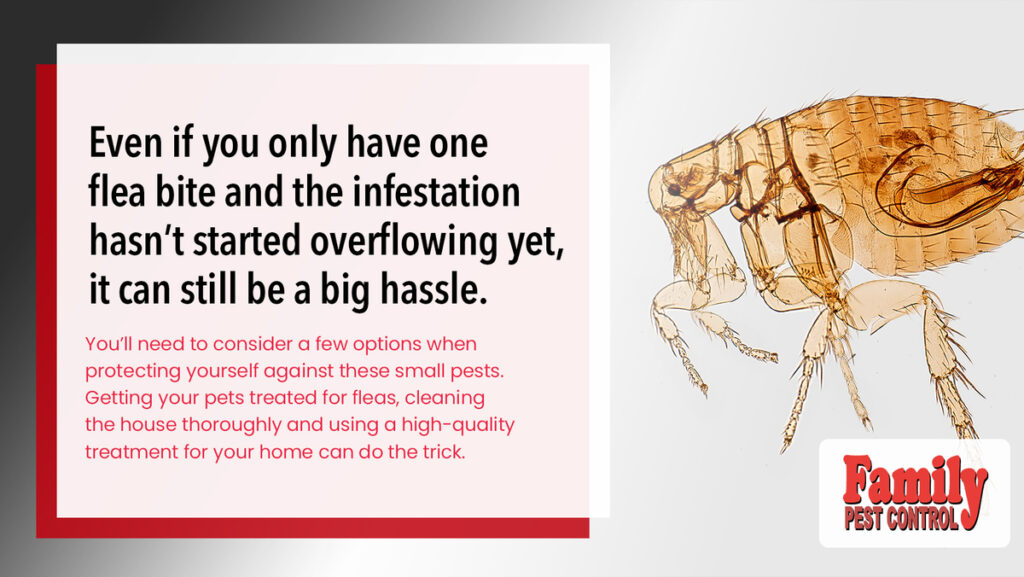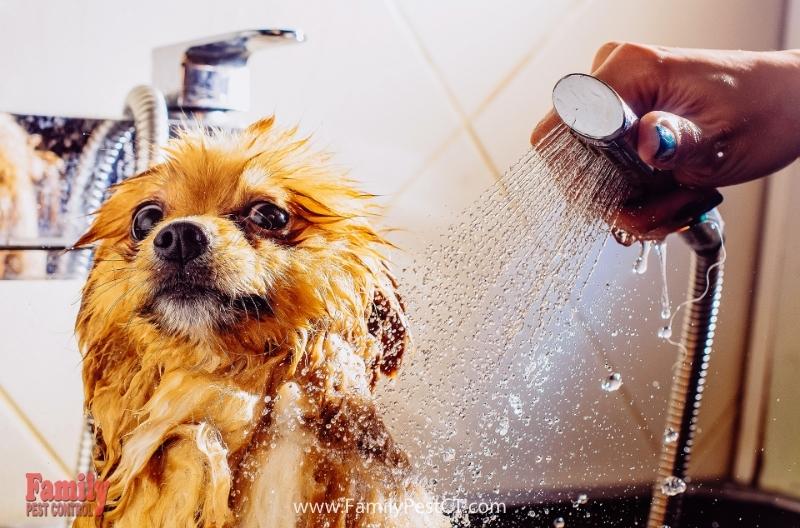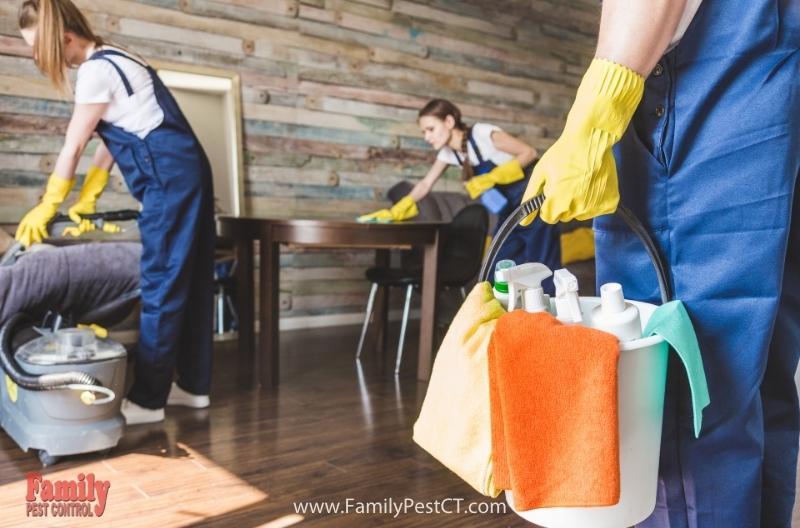Throughout life, we encounter several things that become a nuisance. These include pests such as fleas and ticks. Discovering them is a big hassle, especially if you or your dog likes to be active and outside.
Getting your pets treated for fleas, cleaning, and using a high-quality treatment for your home can prevent your dog from getting fleas and tick bites.
Taking long walks together around the neighborhood is fun for dogs. Some love going to the park with other dogs, which can lead to getting flea and tick bites more than you expect. Then there comes the unbearable itching. How can you prevent this without decreasing your time well spent together outside? How does one avoid these little pests invading your personal space?
This is one of the questions we get the most at Family Pest Control. As a family-owned pest control company, we know and feel your pain regarding things like this. Our experience, material, and skills can help you. We know how to keep fleas and ticks at bay, giving you the relief you and your pup need.
Fleas and ticks prefer to invade your pets’ skin more than your family, but it’s better safe than sorry. Below are tips and tricks to follow so you can prevent flea and tick bites as soon as possible!

Why Do I Keep Getting Flea Bites?
As you’re reading this, you might have run an encounter already with fleas and ticks. Whether it’s just one bite or a bigger one, it can bring you a lot of irritation and trouble. Flea and tick bites translate to constant itching, swelling, and many rashes. For others, it also means that you get hives. Strongly resist the urge to scratch those itches! If not, you will eventually get an infection that needs further treatment. It’s better to prevent the infestation before it gets worse.
You will constantly get flea bites if your dogs or cats have untreated fleas or ticks. These pests are parasites. They mostly prefer feeding and irritating the skin of cats and dogs. But when hungriness takes over, they are willing to invade any warm-blooded animal’s skin. This includes humans.
You probably know how itchy these bites are. They appear as small pink and red spots in groups of three. There’s a certain part of the human population allergic to flea saliva. If you are one of those people, your bites might look larger and feel extremely itchy.
Remember that scratching these itches will do nothing good for you. These bites can let bacteria get in and cause infections. It becomes much worse when the flea that bites you are infected with diseases like tapeworms. This is why preventing flea bites is crucial.
How to Stop Itching from Flea and Tick bites?
Fleas are generally most active whenever the weather is turning warmer. You can often find flea infestations outside where the area is cool, damp, and has a lot of shade. They often inhabit the trees, leaves, grass, and shrubs where your pets often wander.
On your pets, you will often find that they become itchy in certain areas. Such as the ears, neck, abdomen, and back if a flea or tick ever jumps on to them. Make sure you’re not too late to catch on early to the signs of your pet having a flea. Because once your pet walks inside your home, fleas can jump off animals! They hide in your furniture, carpeting, bedding, and sometimes in cracks.
Stop scratching your flea bites and prevent taking the risk of breaking the skin. This ends up exposing you to infection. If you do such, you can keep the area clean by washing with soap and water and covering the bites with bandages. Flea bites are minor and last only a few days, but you can soothe them with aloe vera and ice.
If it’s your pet that’s miserable with the bites, you can also help them soothe the pain. Use aloe vera plants because gels made for humans aren’t recommended. You can also use over-the-counter gels for pets, an ice pack, and more.
What Repels Fleas from Biting Humans?
If you’re not yet at the stage of a full-on infestation, take a deep breath. Maybe you’re trying to avoid reaching that point. Whichever the case, here are some things that you can use to protect yourself from getting bitten.

1. Try to Cover Up With Clothes
Fleas can jump on both humans and animals, even if they are several inches away. They usually begin to live where your pet usually goes. Sometimes, this is on your carpeting, a pet’s bedding, the floor, or anywhere your pet frequents. But one thing to remember is that fleas don’t bite through your clothes.
Wearing clothes with long sleeves, pants or pajamas, and even wearing socks can help you. In cases where you’re afraid to get it outside most of the time, and the weather is too hot to wear longer clothing, carry bug spray with you. It might not guarantee a 100% chance of beating the fleas and ticks, but it helps keep them away.
2. Scents and Smells Can Keep the Pests Away
Many pests repel certain scents. Fleas and ticks are no stranger to this. Fleas have an extreme sense of smell, which is what they use when their hunger spikes and they need food sources. Taking advantage of this information can be a cost-efficient way to prevent an infestation.
Before moving on to the more potent chemical pesticides, natural oils and scents can be a small step you can take. Remember not to put these on your pets, though, as it isn’t good for them.
Cedarwood is a good choice as it suffocates fleas and their eggs, even if they are on your pets. Mint and citrus smell good to us humans, but fleas and ticks hate them, as well as other pests too. Try to put some potted mint around your house or have citrus spray around you, like Nootkatone, which is an organic compound that repels fleas.
Chew on this: Chiggers don’t suck your blood, but instead cut into the skin, then inject a skin-digesting saliva. They will eat your liquified skin and can feed on you for days. To avoid chiggers feasting on you, wear long pants and an insect repellant with DEET. pic.twitter.com/hTz6RFqkZa— WillCoForestPreserve (@WillCoForests) July 16, 2020
3. Use DEET
DEET is a popular insect repellent, more commonly known as a mosquito repellent. It is also useful against gnats, ticks, and fleas. The way that DEET works is it masks your scent so that the pests’ senses get confused. This makes it hard for the pests to find their targets.
Products based on DEET are not a scent. Additionally, this method is also one you should use outdoors and not indoors. If you’re afraid of encountering an area with large potential for fleas, DEET is your best option.
Relying on DEET for help in keeping pests away is a classic. However, you should remember that this method should not be directly used on your pet.

4. Take a Bath
This applies to both you and your furry friends. Keeping clean is beneficial for you, not only because it helps you keep fleas and ticks away, but because baths in general make you clean. Fleas and ticks do not really hold a tight grip on your dog or cat’s hair, so bathing them after exploring the outdoors can help those pests fall in the water.
The more your pets are clean, the fewer fleas and ticks will likely attract them. It also helps to use minty shampoos like peppermint, so there is an added kick to keep away parasites.
What Keeps Fleas and Ticks Away?
Experiencing fleas and ticks is more common than one would think, especially if you have more than one furry friend keeping you company at home. More often than not, ticks and fleas find their way to your pet and inside your home before you notice. Sometimes, your home even becomes theirs, too, if you see their presence a little too late.
Be very cautious when it comes to dealing with ticks. Even if there are ticks that don’t necessarily thrive and survive indoors, some do, and you can’t take any chances.
The following will keep fleas and ticks off your property, yourself, and your pets:

1. A Thoroughly Clean Household
The problem with fleas and ticks is that not only do they stick to skin and furniture. They can lay eggs in carpeting or textiles that live for a long time and hatch when the weather is hot enough. The only way to power through this is deep cleaning and being consistent with house cleaning.
Routinely washing anything such as linens, sheets, and even throws can help significantly. Vacuuming the floor can help snatch up any eggs in the carpets and cracks in the floor. It’s good to ensure that trash is sealed up as eggs still survive even in trash bags and vacuum bags.
Keeping a good, thorough cleaning routine at least once or twice a week can help protect you, your pets, and your home from pest infestations.
2. A Flea-Proof Home
The common knowledge is that fleas stick to animals and stay there. However, they only hang on to them for a while. Once your furry friend gets inside your home, those fleas stuck on their bodies can jump off them and attach to furniture and things inside your house. Any surface, even on animal food, can be a place for fleas to hang out.
The good thing is that fleas can be killed by soap and water. So, like the previous tip, deep cleaning and washing can help eliminate them. Get your pet’s bedding, yours, and any rug or textile in your home and wash them thoroughly. It’s also good to hang on to a flea spray if you’re not yet sure of the infestation.
Some people think having fleas is a sign of dirtiness in your house, but it isn’t. Fleas and ticks are hungry creatures. They go to the first food source they find and latch on to it, which can mean your pets and you yourself.
3. A Groomed Backyard
If you’re a homeowner with a backyard, take some time out of your schedule to keep it cleaned and maintained. Any overgrown grass, bushes, or shrubs can become an easy hiding and temporary living space for fleas and ticks.
Making this a habit not only keeps the pests away but can also be a great way to pass the time or relieve stress. You are also keeping your family and pets safe from infestations. This helps in maintaining a good landscape in the backyard too. Do this, especially in the warmer weather, because plants often grow faster during this time.

4. Making Sure Other Pests Don’t Come into Your Property
If you’re 100% sure or at least close to that amount sure that there are no fleas and ticks inhabiting your backyard or household, which is to say that there’s nothing else living there or visiting when you’re not looking? Some stray animals and wildlife that wander in your backyard can introduce fleas and ticks, such as raccoons, skunks, and rodents.
It’s best to keep your family safe by taking measures that can ensure your safety and protection, such as:
- Covering your indoor or outdoor pool, pond, or any personally-owned body of water at night.
- Keeping lids closed securely and tightly on garbage cans, garbage disposal areas, and the like.
- Consulting professionals like us at family pest control so we can help you with your pest or rodent infestations.
Final Thoughts
If fleas and ticks become too much of a problem for you to take on, it will never hurt to ask for help from professionals. At Family Pest Control of Connecticut Inc., we can offer you top-of-the-line, high-quality pest control services, including but never limited to flea and tick control.
Our tick control services can cover areas across different locations! We are in Cheshire, Middlefield, Wallingford, Durham, North Haven, and many areas in Connecticut! Especially those where fleas and ticks are most commonly found. We have the right skills, knowledge, and materials at hand.
Look no further because we have what it takes to help you get the job done of keeping your family safe and protected from the dangers of fleas and ticks. Whether you’re looking for pest or rodent control, we’ve got the right tools to help defend your property from infestations and illnesses. Contact us today at (Family Pest Control’s phone number), and we can help get you started on the basics to get your family safe and secure.

